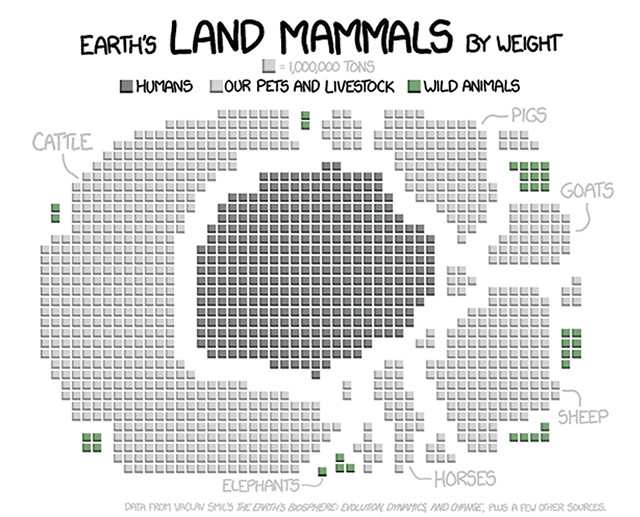
by George A. Seielstad Thursday, January 26, 2017

Illustration of Earth's land mammals by total weight, shown for humans, pets and livestock, and wild animals. Credit: Illxkcd.com/1338/.
In 1960, astronomer and astrophysicist Frank Drake pointed a telescope of the National Radio Astronomy Observatory toward two nearby stars. He was looking for signals that were artificially generated. His was the first modern search for extraterrestrial intelligence (SETI). Drake reasoned that the stars could anchor orbiting planets where life might have taken hold. Over eons, life on the planets might have proliferated, diversified and grown in complexity. Natural selection would have picked winners from among the blossoming variety, and intelligent life — with the ability to sense an environment and analyze information received, as well as to project future scenarios and choose among them — would seem the likely eventual winner. This intelligence could have been used to create wondrous technologies, potentially allowing for communication over interstellar distances.
Drake’s pioneering search was exceedingly bold — though it failed, as have all such searches since. Indeed, we have not yet found any traces of life, let alone intelligent, communicating life, off our planet. There are many reasons why this might be so. Perhaps Earth is truly unique and it simply doesn’t exist. Or perhaps the failure of SETI so far has to do with the fact that the entire amount of space searched is still small. It remains true that the “absence of evidence is not evidence of absence.”
Some factors would seem to strengthen the possibility that intelligent life exists elsewhere. We know that at least one planet may accompany every star and that the Milky Way alone contains a few hundred billion stars. A significant fraction of those planets approximate the size of Earth and are bathed with energy from their stars comparable to what Earth receives from the sun. We also know that life exists in environments on Earth that were considered absolutely inhospitable at the time of Drake’s search. And telescopes similar to the one Drake used have since found evidence of more than 100 types of complex organic molecules — floating in space or hitching rides aboard asteroids and comets — that could conceivably combine into life. The raw materials for life (complex, pre-biotic molecules), locations where it could exist (exoplanets), and energy sources to enable metabolism (stars) are now known to be so abundant that optimists foresee certain SETI success.
But when Drake hypothesized on the factors necessary for SETI success, one stood out as troublesome: the longevity of intelligent civilizations. The question can be asked: Is intelligence an advantage to such an extent that once it is introduced into the trial-and-error process of evolution it will persist? Consider how we have used, and are using, our greatest gift.
The results of humans applying our gift of intelligence have been extraordinary — but they’ve come with consequences. In the 20th century alone, global life expectancy at birth doubled; gross domestic product increased 14 times; energy consumption 16 times; and food production averted the Malthusian crisis even to the extent of introducing obesity as a health concern equal to malnutrition in parts of the world.
However, Homo sapiens has existed only for about 200,000 years, and the genus Homo for about 2 million — just 0.04 percent of Earth’s history. Yet in that short time, we have converted more than half the planet’s land surface to serve our purposes, primarily for food production, and more than 80 percent of Earth’s land surface shows a human footprint. Domesticated land mammals now vastly outnumber wild ones. We use more than half of the available surface freshwater annually. The material humanity moves for its own purposes — the results of our mining, urbanizing, road building, modifications that accompany our infrastructure development, plus the movement of consumer goods — exceeds that moved by wind and water erosion. We have changed the chemical composition of the atmosphere and oceans, melted ice fields, raised sea levels, and eliminated countless species. Thanks to us, a new biosphere is being created more rapidly than the consequences of its creation are being understood.
Humankind has arrived at an inflection point in the history of civilization. Continuing to multiply, expand, extract, produce and destroy at the expense of the entire biosphere may relegate our type of civilization to a brief existence. On the other hand, utilizing our gift of intelligence to limit and reduce human numbers, end our reliance on fossil fuels, consume only for need, protect the ecosystem services that make Earth a living planet, and accept citizenship in a global society will guarantee not just longevity but a noble place in the history of our kind.
The beauty of the gift with which nature has endowed us is that we are free to make choices. By choosing to become responsible stewards of the planet, other intelligent civilizations may one day discover that we were among the fraction that survived — both thanks to, and in spite of, our intelligence.
© 2008-2021. All rights reserved. Any copying, redistribution or retransmission of any of the contents of this service without the expressed written permission of the American Geosciences Institute is expressly prohibited. Click here for all copyright requests.